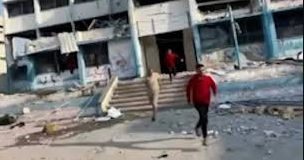
Fear, grief, and cold define the waiting as Gazans anticipate news of a truce
As Gaza endures relentless airstrikes, bitterly cold nights, and scarce resources, its people anxiously await confirmation of a ceasefire deal between Hamas and Israel. On Thursday, amidst delayed announcements, millions hoped for a pause in the violence that has devastated the territory for over 15 months.
Palestinians expressed fears that the ceasefire may falter, prolonging a conflict that has claimed tens of thousands of lives and left much of Gaza in ruins. “The news is tense about the deal … the Israelis do not want Gaza to rest,” said Muhammad al-Hebbil, 37, displaced early in the war from Beit Lahiya to Gaza City.
The agreement, brokered by Qatar on Wednesday, was expected to begin before the US presidential inauguration on Monday. However, reports of disagreements, including accusations that Hamas reneged on parts of the deal and delays in Israeli cabinet approval, have heightened concerns.
Lives Lost Amid Ceasefire Hopes
Heavy bombardments continued in Gaza, with both sides ramping up attacks ahead of the expected ceasefire. Local health officials reported nearly 80 fatalities on Thursday alone, bringing the death toll since the offensive began to over 46,700, primarily civilians.
Ashraf Ahmed Fuaad, a father of three from Khan Younis, described his family’s struggle in the cold. “We are waiting for the ceasefire as if we are waiting for the moon to rise, dispelling the darkness of the night,” he said, adding that their hopes for peace extend beyond Gaza to the entire Middle East.
Others shared tragic accounts of loss. Saeed Alloush recounted a devastating overnight strike that killed 40 members of his extended family. “It was the happiest night since 7 October,” he said, “until we heard of the martyrdom.”
Humanitarian Crisis Deepens
The ongoing conflict has displaced 90% of Gaza’s 2.3 million residents, with tented camps sprawling across destroyed fields and beaches. Infrastructure, including power, water, and healthcare systems, has been obliterated, leaving millions vulnerable to famine and disease.
Aid organisations have called for urgent humanitarian relief, warning of dire shortages in food, medicine, and fuel. The United Nations estimates that clearing the rubble alone could take 15 years and cost up to $600 million, with full reconstruction requiring decades.
Uncertainty Clouds the Future
Despite the anticipated ceasefire, many in Gaza remain sceptical. “I feel we will be betrayed,” said Eman, a 19-year-old medical student from Jabaliya. “I fear the war will return after Israel gets its prisoners.”
With Gaza’s future governance and reconstruction funding unclear, the region’s residents continue to face a precarious reality, torn between fragile hope and persistent fear.










